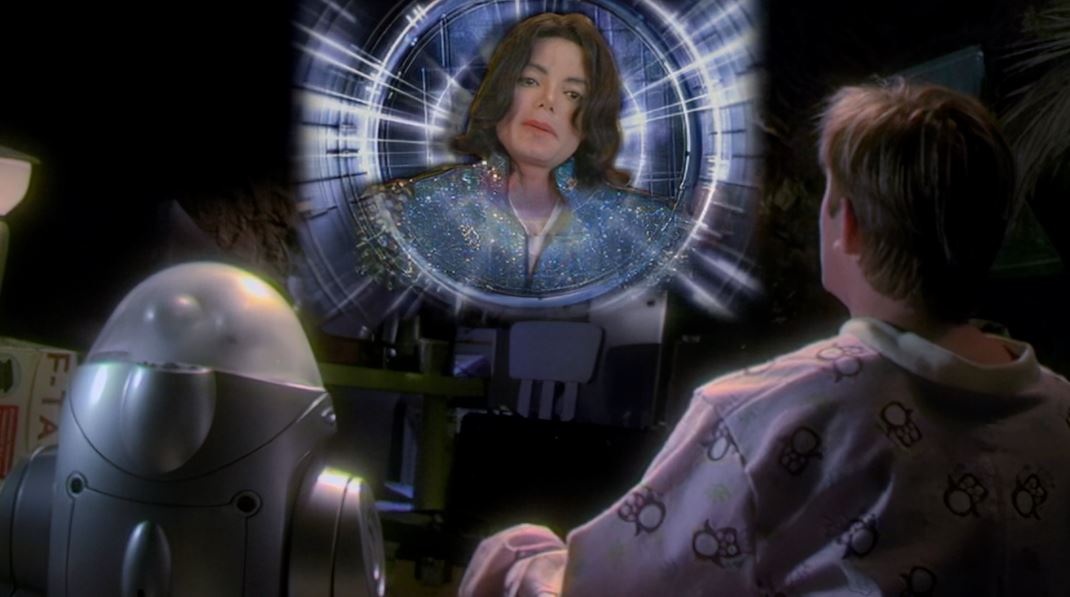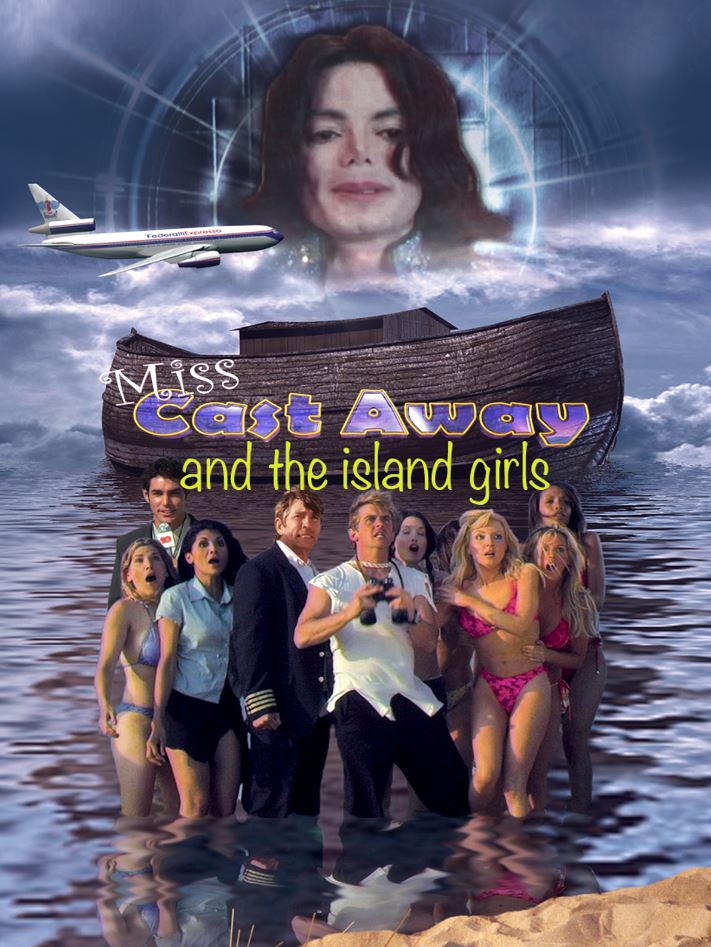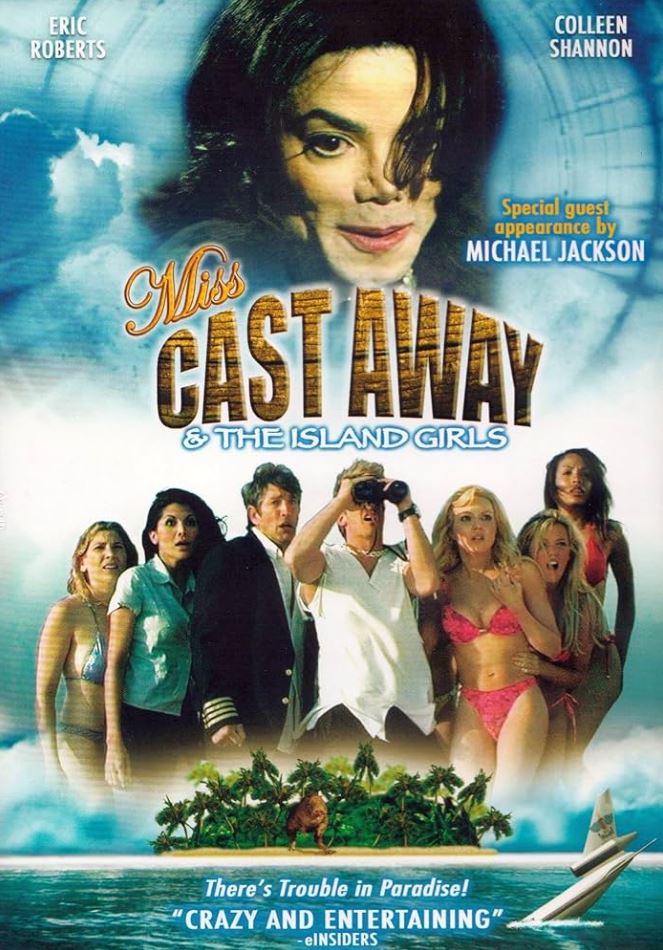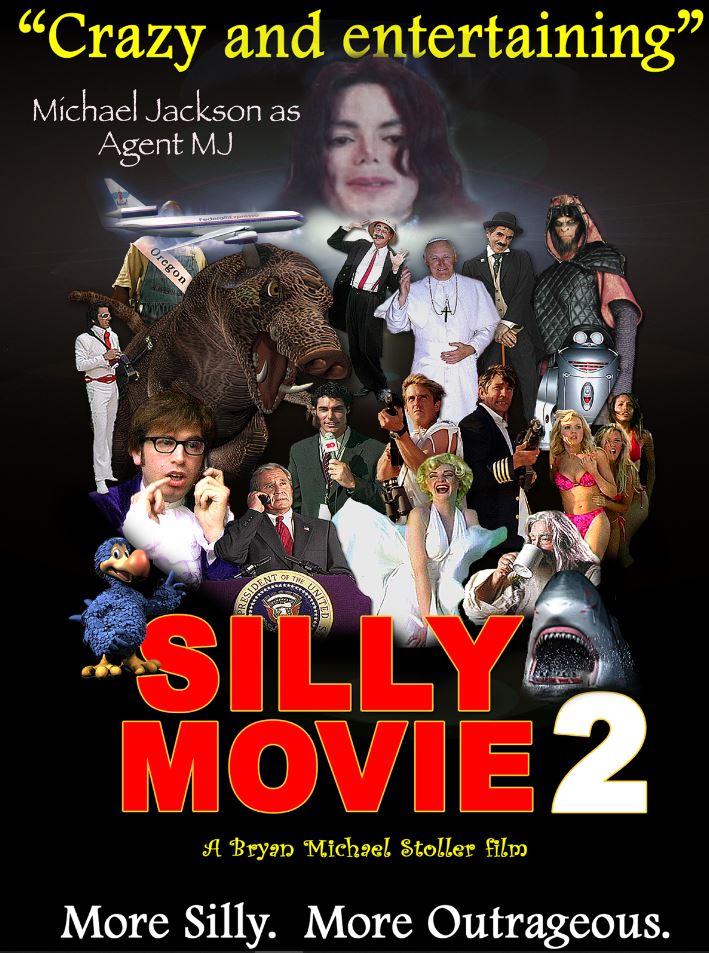“Miss Cast Away and the Island Girls” stands as a unique entry in the realm of parody films, embodying an anarchic spirit of comedy that pokes fun at popular culture and movie tropes. Released in 2004, this American film, penned and directed by Bryan Michael Stoller, thrives on its absurdity and over-the-top antics. It creatively spoofs a myriad of well-known films and television shows ranging from “Miss Congeniality” and “Cast Away” to “Jurassic Park” and “Men in Black,” offering viewers a carousel of familiar yet twisted scenarios.
The film also holds a particular place in cinematic history due to its inclusion of Michael Jackson in what would become his final scripted film performance before his death in 2009. This appearance adds an extra layer of intrigue and nostalgia to the viewing experience. The involvement of Jackson, coupled with the film’s whimsical plot and character dynamics, provides a significant draw for both fans of the iconic pop star and lovers of parody.
Further enhancing its cultural footprint, “Miss Cast Away and the Island Girls” was later re-released under the title “Silly Movie 2” in 2008. This rebranding effort aimed to capitalize on the burgeoning market for spoof films that emerged in the early 2000s. Despite its mixed critical reception, the film has carved out a niche for itself, celebrated by some for its playful humor and by others critiqued for its chaotic style. Regardless, it remains a testament to a time when the zany and the bizarre were embraced with open arms in the comedy genre, reflecting a willingness to push boundaries and challenge conventional storytelling.
| Feature | Details |
|---|---|
| Title | Miss Cast Away and the Island Girls |
| Genre | Parody Film |
| Release Year | 2004 |
| Director | Bryan Michael Stoller |
| Key Spoofs | Miss Congeniality, Cast Away, Jurassic Park, Men in Black |
| Special Appearance | Michael Jackson (final scripted film performance) |
| Re-release Title | Silly Movie 2 (2008) |
| Critics’ Reception | Mixed |
| Film’s Appeal | Anarchic comedy, cultural and nostalgic references |
Contents
Overview of the Film
“Miss Cast Away and the Island Girls” unfolds as a chaotic and whimsical parody that melds elements from various iconic films and TV shows into its narrative. The plot revolves around a plane carrying beauty pageant contestants that crashes on a deserted island. The survivors, led by the intrepid yet comically inept Captain Maximus Powers, portrayed by Eric Roberts, navigate a series of absurd and fantastical challenges. These include encountering bizarre creatures and uncovering a conspiracy involving a secret Vatican mission to manipulate the castaways for mysterious purposes.

Integral to the storyline is Michael Jackson, who plays Agent M.J., a mysterious figure dispatched by the Vatican. His character is pivotal in guiding the narrative with a blend of mystery and comedy, delivering a performance that is both engaging and endearing. This role, marking Jackson’s final scripted film appearance before his passing in 2009, is often noted for its curiosity and the pop star’s characteristic charm, adding a significant layer of appeal to the film.
The themes of “Miss Cast Away and the Island Girls” are as varied as the films it parodies, ranging from survival and conspiracy to the absurdities of fame and pop culture. Its humor is derived from the exaggerated and surreal situations the characters find themselves in, providing a satirical commentary on the very genres it imitates.
| Element | Description |
|---|---|
| Plot Summary | A plane carrying beauty pageant contestants crashes on a deserted island, where the survivors, led by Captain Maximus Powers (Eric Roberts), face absurd challenges and uncover a secret Vatican conspiracy. |
| Main Character | Captain Maximus Powers, portrayed by Eric Roberts |
| Key Cameo | Michael Jackson as Agent M.J., a mysterious Vatican agent, in his final scripted film role. |
| Themes | Survival, conspiracy, fame, and pop culture; satirical commentary on various genres. |
| Humor Style | Exaggerated, surreal, and whimsical, parodying various iconic films and TV shows. |
Cast and Characters Via Video
Aside from Eric Roberts and Michael Jackson, the film features a diverse ensemble cast that contributes to the dynamic and often ludicrous atmosphere of the movie. Charlie Schlatter plays Mike Saunders, the co-pilot whose pragmatic approach often clashes humorously with Captain Powers’ bizarre methods. Joyce Giraud stars as Julie, a beauty queen who proves to be both resourceful and resilient, challenging the stereotypes typically associated with pageant contestants.
Stuart Pankin appears as Noah, another quirky member of this castaway crew, while Evan Marriott, famous for his role in the reality show “Joe Millionaire,” plays a satirized version of himself, adding another layer of meta-humor to the film. The array of pageant contestants, each representing different states, adds color and diversity to the storyline, with performances by Colleen Shannon as Miss Texas, Blythe Metz as Miss Delaware, and Jackie Torres as Miss Congenial, among others.
Additionally, the film boasts cameo appearances by noted actors such as Pat Morita and Bernie Kopell, whose brief roles provide moments of delightful recognition for the audience and lend an air of nostalgia and humor. These cameos not only enhance the film’s comedic appeal but also bridge the connection between the old and new Hollywood, serving as a nod to the extensive reach and influence of popular culture that the film seeks to parody.
Overall, “Miss Cast Away and the Island Girls” is an eclectic mix of humor, absurdity, and satire, powered by its diverse cast and the unique inclusion of Michael Jackson in one of his last film roles. This ensemble not only entertains but also subtly critiques the very elements of pop culture that have made films like it so memorable and enduring.
| Actor | Character | Description |
|---|---|---|
| Charlie Schlatter | Mike Saunders | The pragmatic co-pilot whose rational approach often humorously contrasts with Captain Powers’ bizarre methods. |
| Joyce Giraud | Julie | A resourceful and resilient beauty queen who challenges the typical stereotypes of pageant contestants. |
| Stuart Pankin | Noah | A quirky member of the castaway crew, adding to the film’s eccentric atmosphere. |
| Evan Marriott | Himself | Plays a satirical version of himself, adding a layer of meta-humor. |
| Colleen Shannon | Miss Texas | One of the pageant contestants, contributing to the diversity and color of the storyline. |
| Blythe Metz | Miss Delaware | Another contestant, each representing different states and adding to the film’s eclectic mix. |
| Jackie Torres | Miss Congenial | Portrays a character that enriches the narrative’s diversity. |
| Pat Morita | Cameo Appearance | Provides a moment of delightful recognition, enhancing the nostalgic appeal. |
| Bernie Kopell | Cameo Appearance | Adds humor and serves as a nod to the extensive reach of popular culture. |
Production Details
“Miss Cast Away and the Island Girls” was brought to life under the directorial vision of Bryan Michael Stoller, with a modest budget of $2 million. Stoller, known for his eclectic approach to filmmaking, crafted a film that blends absurdity with satire, utilizing a wide array of parodic elements drawn from various popular films. The budget, although relatively low for a feature film, was adeptly managed to accommodate a diverse cast, special effects, and unique filming locations, notably Michael Jackson’s own Neverland Ranch.

The decision to film at Neverland Ranch was both a strategic and thematic choice, providing the film with an enchanting backdrop that complemented its whimsical and surreal atmosphere. However, filming at such a distinctive and personal location brought its own set of challenges and unique stories. Bryan Michael Stoller shared several anecdotes in an MTV interview about the filming process at the ranch. He recounted how normal it was for Jackson to have a train running around the property, which would often interrupt filming with its loud horn. In another instance, while the crew was enjoying soup provided by Jackson’s staff, two elephants casually walked by—a sight that barely fazed Jackson but left the crew in awe. These incidents highlighted the surreal and unpredictable environment that enveloped the set, adding to the film’s quirky and unpredictable nature.
| Aspect | Details |
|---|---|
| Director | Bryan Michael Stoller |
| Budget | $2 million |
| Filming Location | Neverland Ranch (owned by Michael Jackson) |
| Filming Atmosphere | Whimsical and surreal, complemented by the unique features of Neverland Ranch like trains and wandering elephants. |
| Director’s Approach | Eclectic, blending absurdity with satire; effectively managed a low budget to include diverse casting, special effects, and unique locations. |
| Anecdotes from Set | Bryan Michael Stoller shared stories about filming interruptions by a train and unexpected encounters with elephants, adding to the quirky production environment. |
Challenges and Release
The film’s release trajectory was significantly impacted by Michael Jackson’s legal troubles during the mid-2000s. Initially scheduled for a theatrical release in the summer of 2004, the film’s distributors became hesitant due to the media coverage of Jackson’s legal issues. This uncertainty led to a reevaluation of the film’s release strategy. Director Bryan Michael Stoller expressed disappointment in press releases, noting that the legal distractions overshadowed what he believed was Jackson’s “amazing vision” for the film. The concern was not just about the film’s association with Jackson, but also about its title and thematic elements potentially clashing with the then-recently released Tom Hanks’ film, “Cast Away,” which could confuse audiences and dilute the brand’s distinctiveness.

Despite these challenges, “Miss Cast Away and the Island Girls” found its way to audiences through alternative platforms. The film was showcased in three different film festivals throughout 2004, which helped in gaining some critical attention albeit mixed reviews. In 2005, the film premiered on television in Russia, a move that expanded its international reach. Eventually, the film was released on DVD in the United States in July 2005, which included bonus features that captured some of the behind-the-scenes antics and the unique filming experience at Neverland Ranch.
The film’s journey did not end there; in July 2011, it was announced that “Miss Cast Away and the Island Girls” would have its world premiere on My Family TV, Retro Television Network, and Tuff TV in the fall of 2011. This release was to include a special limited DVD edition featuring 20 minutes of unreleased footage showcasing Michael Jackson’s involvement. This later release attempted to revive interest in the film by emphasizing Jackson’s role and the unique aspects of its production, appealing to both fans of the late pop star and enthusiasts of parody films.
Through all these phases, “Miss Cast Away and the Island Girls” exemplifies a film that, despite facing significant hurdles—from its production quirks at Neverland Ranch to the complexities of its release—managed to carve a niche for itself in the landscape of early 2000s cinema. The film remains a testament to the challenges and triumphs of independent filmmaking, particularly when intertwined with the life of one of pop culture’s most iconic figures.
| Event | Description |
|---|---|
| Initial Release Plan | Scheduled for theatrical release in summer 2004; postponed due to Michael Jackson’s legal issues and concerns about confusion with “Cast Away.” |
| Director’s Reaction | Bryan Michael Stoller expressed disappointment, feeling that legal distractions overshadowed Jackson’s vision and the film’s potential. |
| Alternative Release | Shown at film festivals in 2004, premiered on television in Russia in 2005, and released on DVD in the US in July 2005. |
| Special DVD Edition | Released in 2011 with 20 minutes of unreleased footage showcasing Michael Jackson’s involvement. |
| Cultural Impact | Despite challenges, the film found a niche audience and remains a testament to the complexities of independent filmmaking linked to a pop culture icon. |
Special Releases and Premieres
In July 2011, “Miss Cast Away and the Island Girls” saw a resurgence in interest with a world premiere that spanned multiple television networks including My Family TV, Retro Television Network, and Tuff TV. This premiere was part of a strategic attempt to reintroduce the film to a new audience and to capitalize on the enduring popularity of Michael Jackson. The film’s re-release was not just a typical broadcast; it was a special event that included 20 minutes of previously unreleased footage featuring Jackson, providing fans and new viewers alike a deeper glimpse into his involvement in the film.

Accompanying the television premiere was the announcement of a special limited DVD release. This edition was particularly significant as it included the extra footage of Jackson, which was a major selling point. This release strategy highlights how pivotal Michael Jackson’s role was not only to the film’s production but also to its marketing and continued legacy. The re-release aimed to draw attention not only to the film’s comedic and parodic elements but also to its unique place as one of the last projects involving one of the most iconic figures in entertainment.
| Event | Details |
|---|---|
| World Premiere Networks | My Family TV, Retro Television Network, and Tuff TV. |
| Premiere Date | July 2011 |
| Re-release Strategy | Aimed to reintroduce the film to a new audience and capitalize on the enduring popularity of Michael Jackson. |
| Special Features | Included 20 minutes of previously unreleased footage featuring Michael Jackson, providing a deeper glimpse into his role. |
| Significance of DVD Release | The special limited DVD release featured the extra footage of Jackson, serving as a major selling point to draw attention to his pivotal role in the film’s production and legacy. |
| Marketing Focus | Highlighted the film’s comedic and parodic elements, as well as its unique place as one of the last projects involving Michael Jackson. |
Critical Reception and Legacy
Upon its initial release, “Miss Cast Away and the Island Girls” received mixed reviews from critics and audiences. The film’s reception was polarized primarily due to its absurd and sometimes chaotic humor, which while resonating with fans of parody and slapstick, did not universally appeal to all viewers. Critics often pointed out the disjointed narrative and the seemingly nonsensical plot as drawbacks. However, others appreciated the film for its boldness in combining numerous cultural references and its unapologetic embrace of the parody genre.

The film holds a peculiar place in cinematic history, not just as a parody but also as a cultural artifact of the early 2000s’ pop culture landscape. It serves as a time capsule of sorts, reflecting the cinematic and cultural tastes of an era that was heavily inclined towards spoofs and comedic exaggerations. “Miss Cast Away and the Island Girls” is often discussed not just for its content but also for its context within the broader narrative of early 21st-century film trends.
Moreover, its legacy is intricately tied to Michael Jackson’s filmography. While Jackson had a more celebrated career in music, his foray into films, particularly through this final scripted performance, adds a distinctive layer to his artistic persona. For fans and cultural historians, Jackson’s role as Agent M.J. offers a glimpse into his lesser-known artistic endeavors outside of music. His involvement adds a layer of interest and significance to the film, making it a noteworthy study for those interested in his life and career.
The film’s re-emergence in 2011, with the special releases and premieres, underscored its enduring appeal, particularly among Jackson’s fan base. It also reaffirmed the film’s status as a unique piece of cinematic history, marked by its ambitious attempts at humor and its collection of memorable, if not surreal, moments. The additional footage released in the special DVD edition helped paint a fuller picture of Jackson’s involvement, which is crucial for understanding his multifaceted artistic legacy.
In conclusion, while “Miss Cast Away and the Island Girls” may not have achieved blockbuster status, its importance lies in its audacity to mock and mimic, its role in the tapestry of Michael Jackson’s diverse career, and its reflection of a specific era’s cultural dynamics. The film’s mixed reception is less a verdict on its quality and more a commentary on its distinct style and the diverse tastes of its viewers, making it a subject of interest for both film enthusiasts and scholars alike.
| Aspect | Details |
|---|---|
| Initial Reception | Mixed reviews; appreciated for its bold parody and cultural references but criticized for its chaotic humor and disjointed narrative. |
| Cinematic Position | Serves as a cultural artifact of early 2000s pop culture, reflecting the era’s penchant for spoofs and comedic exaggerations. |
| Michael Jackson’s Role | His final scripted film performance as Agent M.J. adds a distinctive layer to his artistic persona and is a point of interest for his fans and cultural historians. |
| 2011 Re-release Impact | Re-emphasized the film’s unique place in cinema history and Michael Jackson’s filmography; special DVD release with extra footage provided deeper insights into Jackson’s involvement. |
| Legacy and Significance | The film is valued not for blockbuster status but for its audacity in parody, its reflection of cultural trends, and its role in Michael Jackson’s diverse career. |
“Miss Cast Away and the Island Girls” embodies a distinct moment in film history, encapsulating the early 2000s’ fascination with parodic and anarchic humor. As a parody, it dared to intertwine elements from numerous blockbuster hits and popular culture phenomena, creating a tapestry of references that spoke directly to the cinema-savvy audience of its time. The film’s significance, however, transcends its surface-level comedy and eclectic narrative, embedding itself into the cultural fabric through its unconventional production choices and its connection to one of the most iconic figures in entertainment history—Michael Jackson.
The film’s cultural impact is multifaceted. Firstly, it serves as a vivid example of the parody genre that was particularly prevalent during its release period. Films like “Scary Movie” and “Not Another Teen Movie” had already primed audiences for this type of humor, and “Miss Cast Away” extended this tradition by adding its unique flavor. By spoofing everything from “Jurassic Park” to “The Love Boat,” it not only provided entertainment but also offered a critique of the film industry’s penchant for repetitive themes and sequels, poking fun at the very foundation of popular films and television shows.
Secondly, the involvement of Michael Jackson adds a profound layer of interest and complexity to the film. Jackson was not just a global music superstar but also a figure whose life and career were marked by spectacular public highs and equally publicized lows. His role in this film—coming during a tumultuous period in his life—highlights the intersection of celebrity culture and cinema, offering insights into how stars navigate their public and professional lives. For Jackson, whose career was overwhelmingly defined by his musical achievements, “Miss Cast Away” represents a rare glimpse into his acting endeavors and his willingness to engage in projects that were unorthodox and outside mainstream expectations.
The enduring interest in films featuring celebrities like Michael Jackson underscores a broader cultural phenomenon where the allure of celebrity involvement in movies can significantly affect their reception and legacy. Jackson’s presence in “Miss Cast Away” elevates the film’s status from a mere cinematic oddity to a piece of interest for his fans and pop culture historians. It becomes a part of the broader narrative of his life, offering a window into his personal interests and his lesser-known artistic pursuits.
Moreover, this interest in celebrity-driven films speaks to the ongoing fascination with the lives of public figures. Celebrities bring a ready-made audience to their projects, which can drive the commercial and critical reception of a film. In the case of Michael Jackson, his involvement likely drew viewers who might have otherwise overlooked the film, providing it with a wider audience and more extended discussion than it might have garnered based on its content alone.
In conclusion, “Miss Cast Away and the Island Girls” stands as more than just a comedic endeavor; it is a cultural artifact that reflects the dynamics of its era, the nature of celebrity involvement in cinema, and the specific peculiarities of its production. Its significance lies not only in its attempt to entertain but also in its capacity to provoke thought about the nature of film as a medium for broader commentary. As such, it remains a noteworthy piece in the annals of film history, particularly for those interested in the confluence of celebrity culture and cinematic expression.

